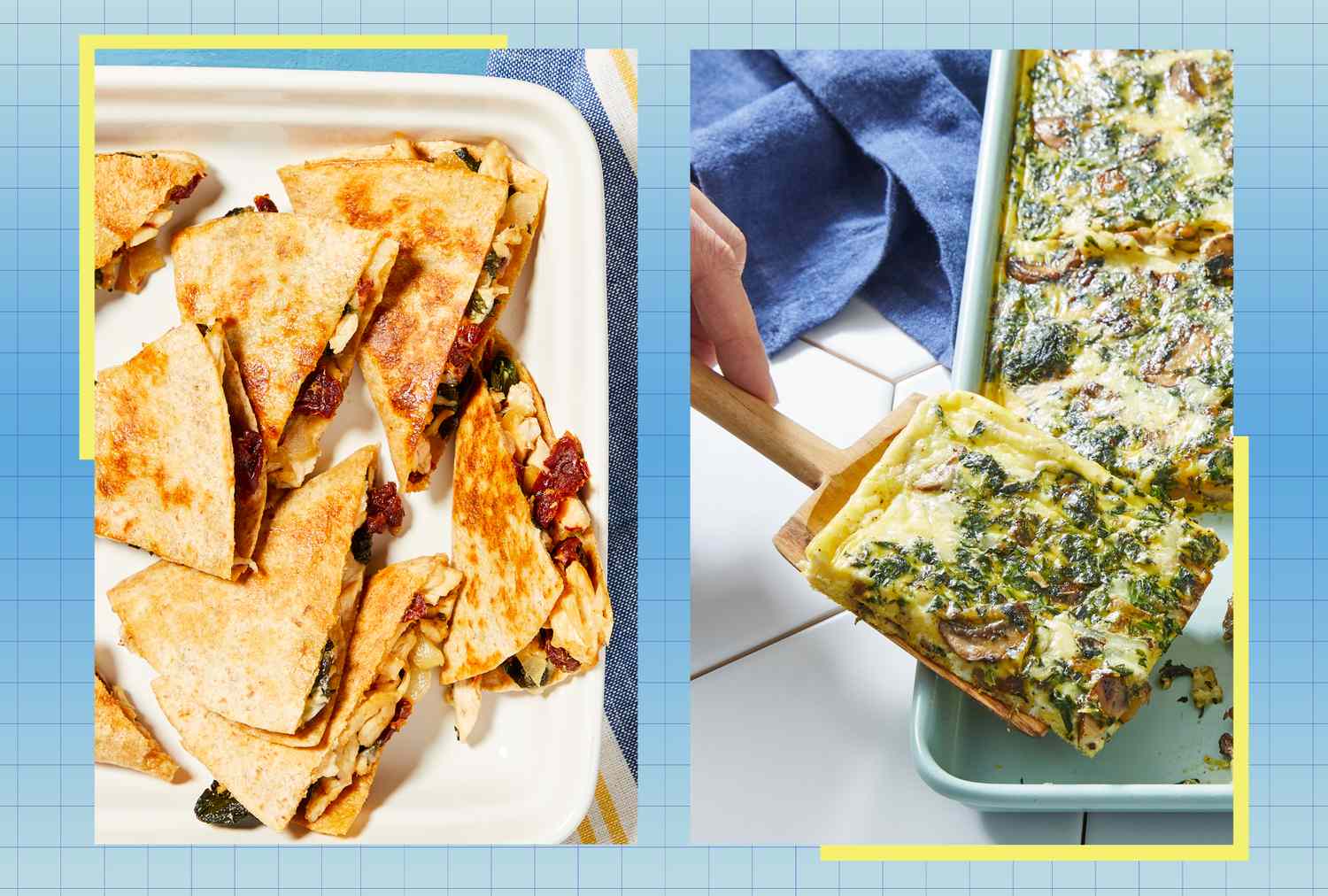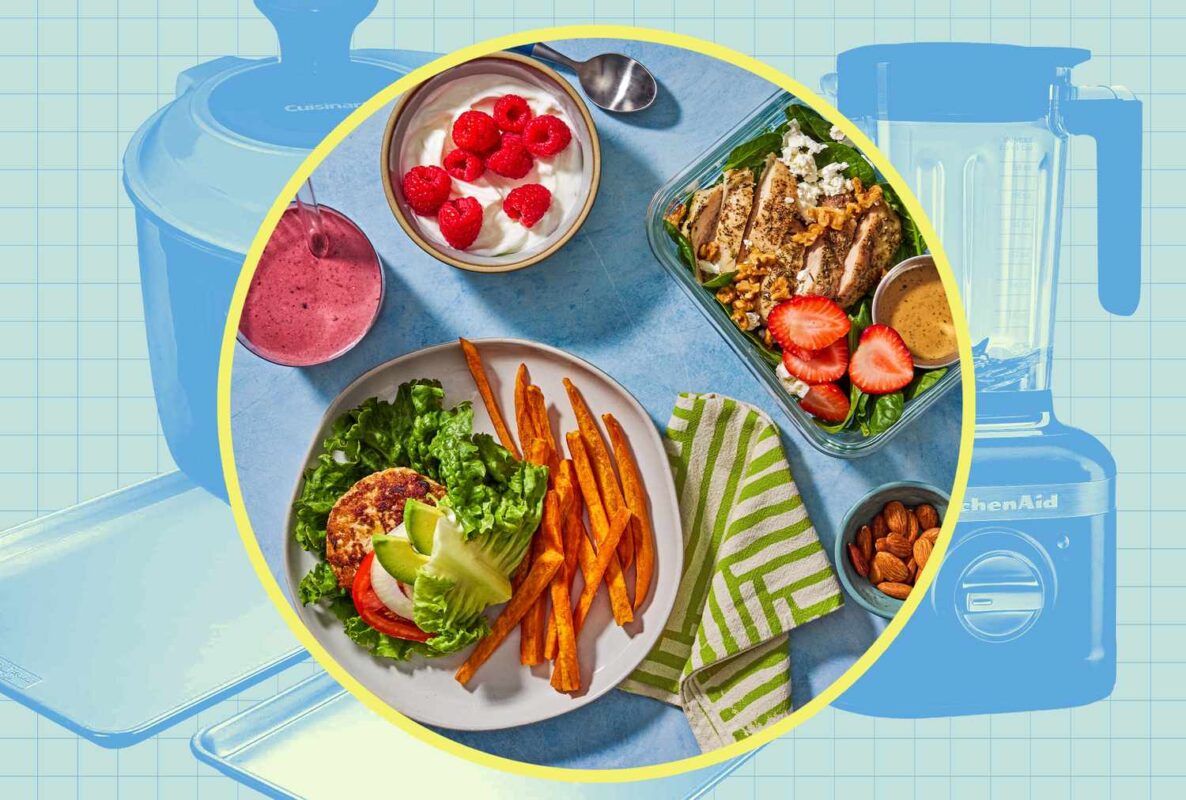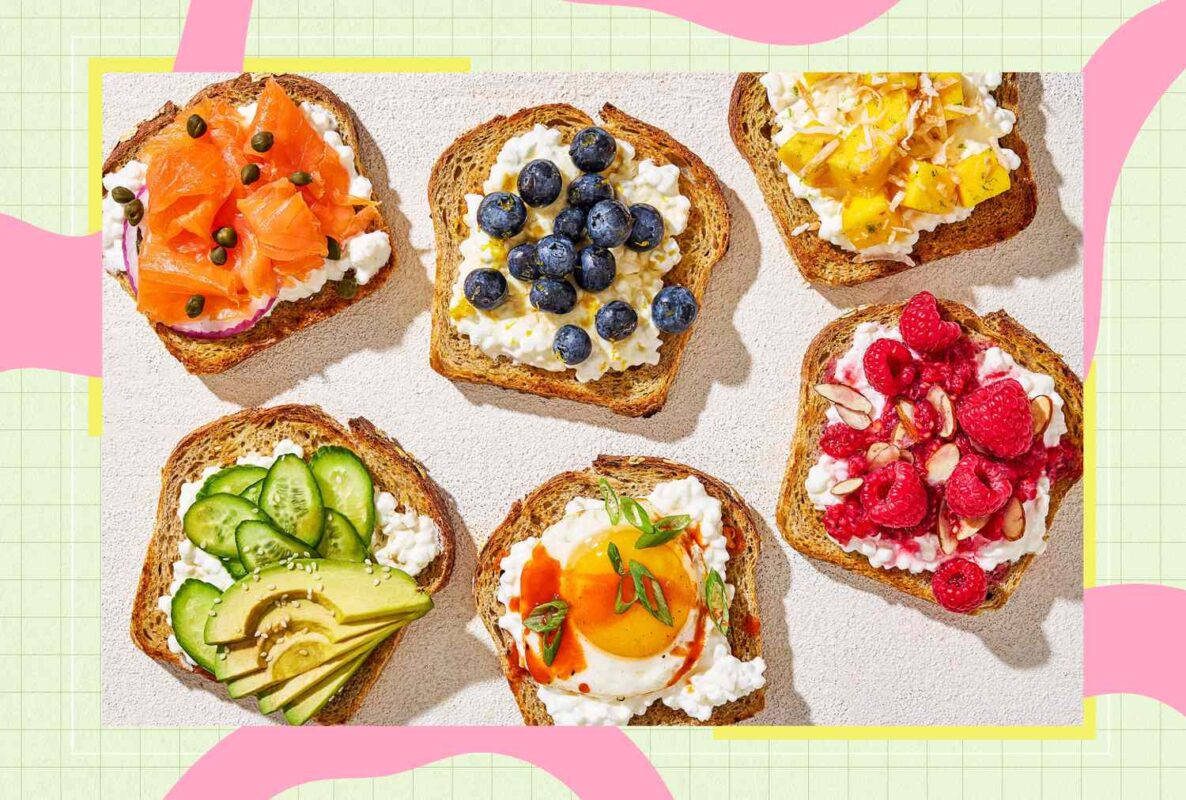Blog
No-Sugar Anti-Inflammatory Meal Plan for High Blood Pressure

| Meal Plan at a Glance | ||
|---|---|---|
| BREAKFAST/ A.M. SNACK | LUNCH/ P.M. SNACK | DINNER/ LATE-NIGHT SNACK |
| Nut butter toast/ Almonds & fruit | Chicken salad/ Cucumber & hummus | Spaghetti/ Banana ice cream |
| Yogurt & fruit/ Roasted chickpeas | Shrimp salad/ Walnuts | Salmon & salad/ Nice cream |
| Smoothie/ Carrots & ranch | Chicken salad/ Apple | Fish fillet & lentils |
| Eggs & fruit/ Kefir & fruit | Lentils & rice/ Trail mix | Chicken quesadillas & salad |
| Eggs & fruit/ Yogurt & fruit | Chicken quesadillas/ Trail mix | Tofu salad/ Watermelon |
| Eggs & fruit/ Kefir & fruit | Hummus wrap/ Trail mix | Shrimp pasta & broccoli |
| Smoothie/ Apple & walnuts | Hummus wrap/ Orange | Chicken casserole/ Banana ice cream |
Day 1
Breakfast (210 Calories)
Morning Snack (261 calories)
- 1 cup cantaloupe
- 1/4 cup unsalted dry-roasted almonds
Lunch (353 calories)
Afternoon Snack (154 calories)
- 1 cup cucumber slices
- 1/3 cup hummus
Dinner (373 calories)
Evening Snack (158 calories)
Daily Totals: 1,508 calories, 68 g protein, 142 g carbohydrate, 32 g fiber, 81 g fat, 1,373 mg sodium
To make it 2,000 calories: Add 2 hard-boiled eggs to breakfast, increase to ⅓ cup almonds at A.M. snack, add ½ cup cooked quinoa to lunch, increase to 6 Tbsp. hummus at afternoon snack and add 3 oz. cooked chicken to dinner.
Day 2
Breakfast (299 Calories)
- 1 cup nonfat plain Greek yogurt
- 1/4 cup raspberries
- 1/4 cup sliced almonds
- 1 teaspoon chia seeds
Morning Snack (109 calories)
Lunch (321 calories)
Afternoon Snack (218 calories)
Dinner (481 calories)
Evening Snack (73 calories)
Daily Totals: 1,500 calories, 108 g protein, 103 g carbohydrate, 25 g fiber, 75 g fat, 1,164 mg sodium
To make it 2,000 calories: Add 1 whole-wheat English muffin to breakfast, increase to 2 servings chickpeas at A.M. snack, add ½ cup cooked quinoa to lunch, increase to ½ cup walnut halves at afternoon snack and increase to 1½ servings at evening snack.
Day 3
Breakfast (424 calories)
Morning Snack (201 calories)
Lunch (353 calories)
Afternoon Snack (95 calories)
Dinner (424 calories)
Daily Totals: 1,497 calories, 93 g protein, 153 g carbohydrates, 35 g fiber, 66 g fat, 1,440 mg sodium
To make it 2,000 calories: Add 2 hard-boiled eggs to breakfast, add 1 cup sliced cucumbers and increase to 2 servings dip at A.M. snack, add ½ cup cooked quinoa to lunch and add 10 almonds to afternoon snack.
Day 4
Breakfast (301 calories)
Morning Snack (132 calories)
- 1 cup nonfat plain kefir
- 1/2 cup blueberries
Lunch (403 calories)
Afternoon Snack (150 calories)
Dinner (518 calories)
Daily Totals: 1,504 calories, 79 g protein, 165 g carbohydrate, 29 g fiber, 64 g fat, 1,876 mg sodium
To make it 2,000 calories: Add 1 whole-wheat English muffin to breakfast, add 3 Tbsp. cashews to A.M. snack, increase to 2 servings trail mix at afternoon snack and increase to ¼ cup avocado and 2 Tbsp. dressing at dinner.
Day 5
Breakfast (309 calories)
Morning Snack (306 calories)
- 1 cup nonfat plain Greek yogurt
- 3/4 cup sliced strawberries
- 1/4 cup sliced almonds
Lunch (417 calories)
Afternoon Snack (150 calories)
Dinner (268 calories)
Evening Snack (51 calories)
Daily Totals: 1,501 calories, 97 g protein, 137 g carbohydrate, 21 g fiber, 68 g fat, 1,934 mg sodium
To make it 2,000 calories: Add 1 whole-wheat English muffin to breakfast, increase to 2 servings trail mix at afternoon snack and add 3 oz. cooked chicken and 1½ Tbsp. sunflower seeds to dinner.
Day 6
Breakfast (268 calories)
Morning Snack (191 calories)
- 1 medium pear
- 1 cup nonfat kefir
Lunch (339 calories)
Afternoon Snack (150 calories)
Dinner (546 calories)
Daily Totals: 1,495 calories, 78 g protein, 168 g carbohydrates, 37 g fiber, 66 g fat, 1,852 mg sodium
To make it 2,000 calories: Add 1 whole-wheat English muffin to breakfast, add 2 Tbsp. peanut butter to A.M. snack and increase to 2 servings trail mix at afternoon snack.
Day 7
Breakfast (465 calories)
Morning Snack (160 calories)
- 1 medium apple
- 5 walnut halves
Lunch (339 calories)
Afternoon Snack (35 calories)
Dinner (349 calories)
Evening Snack (158 calories)
Daily Totals: 1,505 calories, 61 g protein, 221 g carbohydrate, 41 g fiber, 51 g fat, 1,070 mg sodium
To make it 2,000 calories: Add 1 cup nonfat Greek yogurt to A.M. snack, add 1½ servings Homemade Trail Mix to afternoon snack and increase to 1 serving at evening snack.
Frequently Asked Questions
Is it OK to mix and match meals if there’s one I don’t like?Yes! This meal plan is meant to serve as inspiration. It doesn’t need to be followed exactly to reap the benefits. When choosing recipes, we made sure to check the calories, fiber, protein and sodium to align with the parameters of this plan and be within our sodium limits. If you’re making a recipe swap, it may be helpful to choose a recipe with similar calories, fiber, protein and sodium levels. For more inspiration, check out our Anti-Inflammatory Diet Center.
Can I eat the same breakfast or lunch every day?Definitely, it’s fine to eat the same breakfast or lunch every day. The breakfasts range from 210 to 465 calories while the lunches span 321 to 417 calories. These ranges are fairly close, though if you’re closely monitoring your calories or other nutrients, like protein, you may want to adjust a snack or two.
Why is there not a modification for 1,200 calories?We no longer provide modifications for 1,200-calorie days in our meal plans. The 2020-2025 Dietary Guidelines for Americans suggests that limiting calories to 1,200 per day is too low for most people to meet their nutritional needs, plus it’s unsustainable for long-term health and well-being.
What are added sugars?Added sugars are the sugars that are added during the processing of a food. Even natural sugars, like honey, maple syrup and agave, are considered “added sugars” if they are put in a food. These differ from sugars that are naturally found in fruits, vegetables and dairy. If sugar is added to a fruit (like in canned fruit) or added to milk (to make chocolate milk), those would be considered added sugars.
Health Benefits of the DASH Diet
To help reduce blood pressure, this meal plan takes the hallmark features of the DASH diet and combines them with anti-inflammatory foods. In particular, these foods are high in potassium, anthocyanins, omega-3 fatty acids, magnesium, fiber and heart-healthy monounsaturated fats. But there is another benefit to following the DASH diet. Research shows that the DASH diet can also help reduce inflammation. This is important because while doctors are still not entirely sure how inflammation causes heart attack and stroke, they know that the inflammatory response to cholesterol plaques in the arteries may directly contribute to cardiac events.
How We Create Meal Plans
Registered dietitians thoughtfully create EatingWell’s meal plans to be easy-to-follow and delicious. Each meal plan meets specific parameters depending on the health condition and/or lifestyle goal it is targeting and is analyzed for accuracy using the nutrition database, ESHA Food Processor. As nutritional needs differ from person to person, we encourage you to use these plans as inspiration and adjust as you see fit.
Dig Deeper
The Best and Worst Foods for Healthy Blood Pressure
What Is an Anti-Inflammatory Diet? Health Benefits, Tips and More












